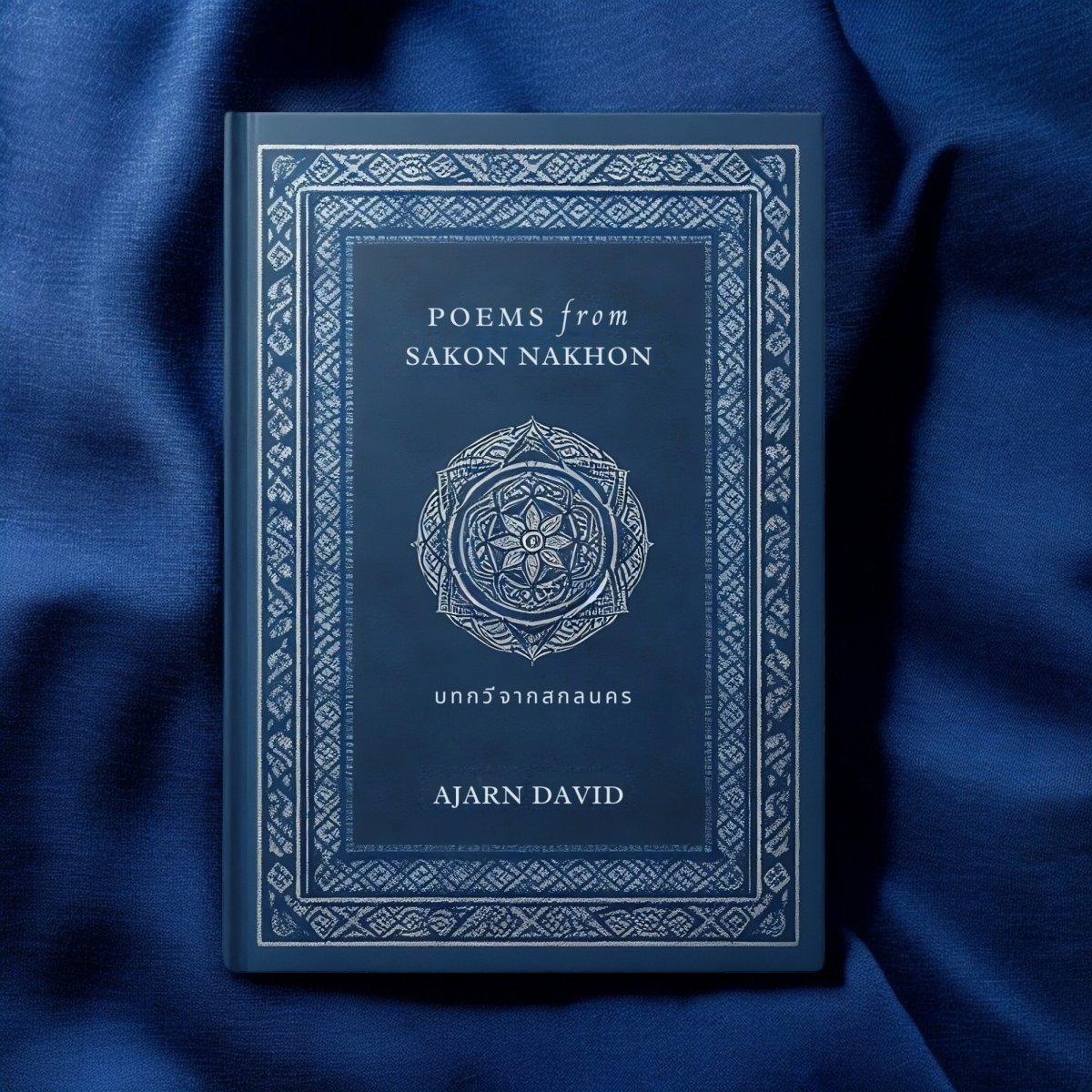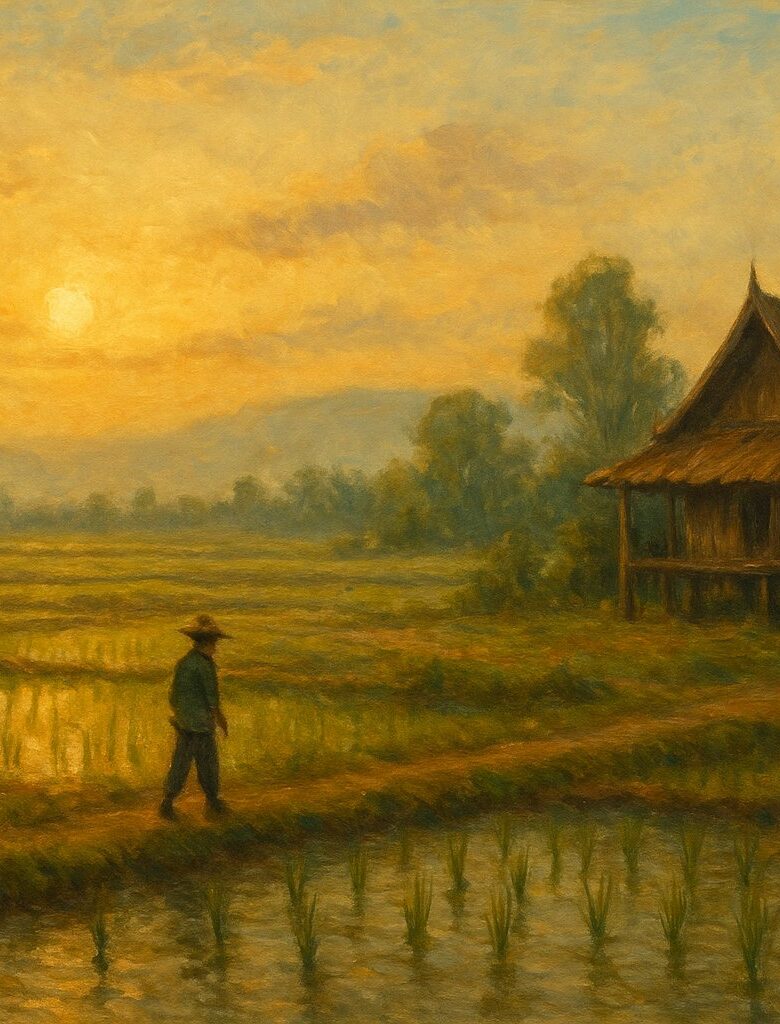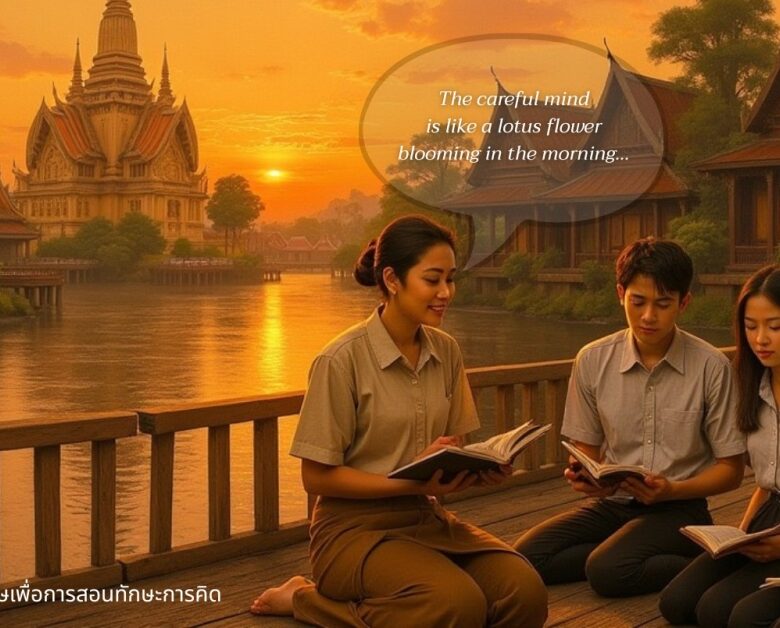"Ajarn David’s Poems from Sakon Nakhon offers a rare and insightful look at Thailand, blending personal experience with deep cultural reflection. It is both accessible and thoughtful, making it a valuable contribution to the understanding of Isaan life, spirituality, and the Thai worldview."
Bilingual Thai Poetry
O
ne of the most compelling aspects of Poems from Sakon Nakhon is its bilingual presentation. Each of the 91 English poems is paired with a Thai translation, inviting both Thai and non-Thai readers to engage with the text. The translations are not merely literal but convey the tone and rhythm of the originals, a feat that demonstrates Ajarn David's deep engagement with Thai language and culture.
For Thai readers, the Thai text adds authenticity and resonance, while English readers are offered an interpretive bridge into the nuances of Thai life and thought. English transliterations of the Thai poems are also included, allowing foreigners who cannot read Thai a glimpse into the musicality and beauty of the Thai language.
Themes of Nature & Place
T
he setting of Sakon Nakhon, a northeastern province in Thailand, shapes the tone and imagery of the collection. The poems draw heavily from the natural cycles of the region, portraying landscapes that feel alive and dynamic. In a poem about the rainy season, Ajarn David captures the annual transformation of the land:
Scorpions appear,
with cobras and crabs,
all seeking safe
higher ground,
This vivid imagery reflects a close observation of nature and its rhythms, tying human activity to the wider ecosystem. These moments ground the collection, providing an unpretentious sense of place that invites readers to linger.
Reflections on Thai Culture
T
hroughout the collection, Ajarn David thoughtfully explores the essence of Thai culture. The poems touch on everyday customs, philosophical ideals, and Buddhist teachings, highlighting the interconnectedness of Thai values and daily life. A poem on what it means to be greng-jai is a standout piece that delves into the concept of considerate thoughtfulness:
It is to have a heart
in awe of others,
of their solitary struggles,
their secret burdens...
This poem underscores the profound respect and empathy embedded in Thai social norms, offering readers a glimpse into a worldview that prioritizes harmony and care for others.
Another key theme is the coexistence of humor and spirituality in Thai life. Ajarn David depicts a nighttime noodle vendor as an angelic figure, serving bowls of comfort to the lonely. These moments reveal the everyday humanity and humor that balance the deeper philosophical undercurrents of the collection.
Buddhist Philosophy & Spiritual Insight
B uddhism is woven throughout the book, not as dogma but as lived experience. Ajarn David reflects on impermanence, suffering, and mindfulness, often drawing connections between these teachings and the natural world. In The First Noble Truth, he writes:
So take up your suffering,
like the stem of a flower,
and let the petals
unfold.
Here, Buddhist wisdom is presented with simplicity and clarity, inviting readers to consider its relevance in their own lives. The collection also frequently references Thai folklore, temple life, and spiritual practices, such as the rainy season retreat, offering a multifaceted view of Thai Buddhism.
The Outsider in Thailand
T
As an expatriate, Ajarn David navigates the complexities of cultural immersion and difference. Even though he has lived and taught at Thai universities for over 20 years, he reflects on the inevitability of always remaining an outsider:
I’ll never be Thai.
But that’s not such
a bad thing...
Rather than lament this reality (as foreign university lecturers never are able to meet the minimum salary requirements for Thai citizenship), he embraces the unique perspective it affords, one that allows him to appreciate and articulate the beauty of Thai culture while maintaining a degree of detachment.
The Structure of the English & Thai Poetry
T
he poems are written in free verse, allowing for a conversational tone that avoids pretense. The language is simple yet evocative, striking a balance between lyricism and accessibility. The imagery feels rooted in lived experience, whether describing the sound of rain sweeping across rice fields or the quiet resilience of an old villager.
Rather than trying to force the Thai translations into the rigid structures of traditional Thai poetic forms like "khlong" or "kap," Ajarn David wisely chooses to use a free style "rai" form that simply incorporates occasional rhyme and alliteration to enhance the musicality of the translated poems (while staying as close as possible to the meaning of the original English poem).
The bilingual structure of Poems from Sakon Nakhon also highlights how language shapes thought. For example, the Thai word for “sorry,” khaw tote, carries implications of accountability and humility that differ from its English counterpart. These moments remind readers that language is not just a tool for communication but a vessel for cultural values.
Lingering Lessons
O
ne of the enduring qualities of this collection is its ability to leave readers with moments that resonate long after the book is closed. In a poem about Thailand, Ajarn David captures the nation’s essence not through grandiose descriptions but by focusing on its quieter lessons:
Thailand
has lessons to teach,
not from books
with strange script,
or classrooms
filled with “khru,”
but from life
and how to live it,
from peace
and how to preserve it,
These lines encapsulate the understated yet profound wisdom that runs through the entire collection, inviting readers to reflect on their own lives.
A Lasting Contribution
P
oems from Sakon Nakhon is not just a collection of personal reflections—it is a meaningful exploration of cultural exchange. Ajarn David’s work does not attempt to speak for Thailand but instead offers a bridge, inviting readers to experience its landscapes, traditions, and values through his perspective.
By balancing humor, philosophy, and heartfelt observation, Ajarn David has created a book of Thai poetry that feels approachable and enduring. Whether you are new to Thailand or intimately familiar with it, this collection will leave you with a deeper appreciation for the small moments that shape a life and the interconnectedness of all things.
This is not just a book of poetry — it is an invitation to see the world differently.
Read another book review at LinkedIn: Poems from Sakon Nakhon.






